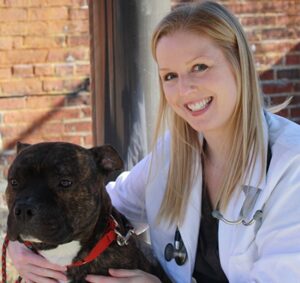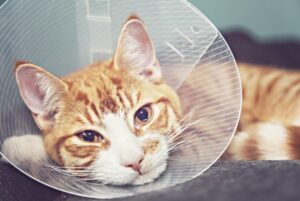-
Adopt
-
Veterinary Care
Services
Client Information
- What to Expect – Angell Boston
- Client Rights and Responsibilities
- Payments / Financial Assistance
- Pharmacy
- Client Policies
- Our Doctors
- Grief Support / Counseling
- Directions and Parking
- Helpful “How-to” Pet Care
Online Payments
Emergency: Boston
Emergency: Waltham
Poison Control Hotline
-
Programs & Resources
- Careers
-
Donate Now
 by Jessica Hamilton, DVM
by Jessica Hamilton, DVM
www.angell.org/emergency
emergency@angell.org
781-902-8400
MSPCA-Angell West, Waltham
Everyone hates e-collars – you know those hard plastic lampshades that your pet has to wear after seemingly every visit to the veterinarian. E-collar is short for Elizabethan collar; they were named after the stand-up collars on women’s dresses in Elizabethan era England. In addition to looking kind of funny, they get caught on doorjambs, on legs, on unsuspecting children. Dogs or cats sometimes knock over their food and water while wearing them and sometimes they even refuse to walk normally. As much as they can be a pain, it is REALLY important that your pet wear the e-collar according to your veterinarian’s recommendations.
 E-collars are generally placed for one simple reason – to prevent your pet from either licking, biting or scratching a wound or surgical site. Even the most well-behaved pets will lick, bite or scratch at a wound or surgical site, if given the opportunity. Sometimes the boredom of being home alone will result in a pet licking or scratching when they would not have otherwise. Even if your pet is well behaved when you are around, you have no way of ensuring that your pet will not hurt him or herself when you are away. No way, that is, except for the e-collar!
E-collars are generally placed for one simple reason – to prevent your pet from either licking, biting or scratching a wound or surgical site. Even the most well-behaved pets will lick, bite or scratch at a wound or surgical site, if given the opportunity. Sometimes the boredom of being home alone will result in a pet licking or scratching when they would not have otherwise. Even if your pet is well behaved when you are around, you have no way of ensuring that your pet will not hurt him or herself when you are away. No way, that is, except for the e-collar!
Although they may seem annoying, they are of vital importance. In the emergency room, we see numerous cases of patients that were not wearing their e-collars as prescribed and chewed out stitches, or worsened wounds, often requiring second surgeries to repair the damage. Licking or chewing at a wound can also result in a severe infection, even antibiotic resistant infections, that require long courses of antibiotics. In some cases, especially when abdominal surgery was involved, life-threatening injuries can result from chewing out stitches. The e-collar may be a hardship, but it’s temporary and proper use can save you hundreds of dollars, and more importantly, save your pet from a lot of unnecessary pain.
If your pet is really having a hard time with the e-collar, you can talk to your doctor about possible alternatives. There are soft padded e-collars and collars that are more like inflatable tubes around the neck, as well as some topical solutions like T-shirts. (see www.angell.org/e-collar) However, these solutions only work for some pets with specific conditions, so please consult with your pet’s doctor before changing the type of collar you are using.
If your pet is having trouble eating or drinking with the e-collar in place, please talk to your veterinarian about removing the collar during supervised feeding times. It is important that you watch your pet closely when the e-collar is off. We can teach you how to safely remove and replace the e-collar, and it is also a good idea to clean the e-collar while it is off, since they can get dirty! If you do not want to remove and replace the e-collar, then you can assist your pet to eat and drink by offering food and water by hand with the e-collar in place.
So, as annoying as it may seem, please do NOT remove the e-collar before you have been directed to do so by your veterinarian. Giving your “cone-head” a little extra love and attention can make the time fly by until you can safely remove it. If your pet has chewed out stitches or gotten to a healing wound, please call your veterinarian right away. Angell Animal Medical Center is staffed with emergency veterinarians 24/7 that can give you advice in case your veterinarian is not available.
For more information on the MSPCA-Angell West Emergency Service, please visit www.angell.org/emergency or call 781-902-8400.